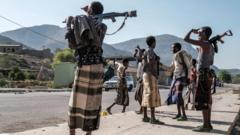The Tigray People's Liberation Front (TPLF) has issued a severe warning regarding the recent decision to ban its activities, deeming it a "serious threat" to the peace agreement established in 2022, which effectively sought to end the devastating two-year conflict in the Tigray region of Ethiopia. The move follows the National Election Board of Ethiopia’s revocation of the TPLF's legal status due to its failure to conduct a general assembly, amid ongoing internal splits and political tensions within the party.
As the party maintains control over Tigray's interim administration—formed as part of the Pretoria peace agreement—the party's internal discord has hindered its ability to hold necessary elections. The TPLF, once the ruling party of Ethiopia before its downfall in 2019, is now facing an uphill battle as it seeks to navigate its legitimacy within the country's evolving political landscape.
Following the electoral board’s decision, the TPLF has called on the African Union to mediate the situation, claiming that the ban violates the provisions of the Pretoria Agreement. A letter sent to the AU highlights their concerns over how the ban undermines the fundamental legitimacy that the peace deal was intended to uphold, with TPLF deputy chairman Ammanuel Assefa articulating fear that the federal government's actions could severely damage the hard-won peace. He stressed that the looming threat of renewed conflict could have devastating implications.
The deteriorating situation has drawn the attention of various international actors, including the United States, the United Kingdom, and the European Union, who have urged both parties to engage in dialogue and avoid a regression to violence. Given the long history of conflict in the region, the specter of renewed hostilities is alarming for both Tigrayans and the wider international community, reminding everyone of the grave human cost associated with the previous civil war.
As the party maintains control over Tigray's interim administration—formed as part of the Pretoria peace agreement—the party's internal discord has hindered its ability to hold necessary elections. The TPLF, once the ruling party of Ethiopia before its downfall in 2019, is now facing an uphill battle as it seeks to navigate its legitimacy within the country's evolving political landscape.
Following the electoral board’s decision, the TPLF has called on the African Union to mediate the situation, claiming that the ban violates the provisions of the Pretoria Agreement. A letter sent to the AU highlights their concerns over how the ban undermines the fundamental legitimacy that the peace deal was intended to uphold, with TPLF deputy chairman Ammanuel Assefa articulating fear that the federal government's actions could severely damage the hard-won peace. He stressed that the looming threat of renewed conflict could have devastating implications.
The deteriorating situation has drawn the attention of various international actors, including the United States, the United Kingdom, and the European Union, who have urged both parties to engage in dialogue and avoid a regression to violence. Given the long history of conflict in the region, the specter of renewed hostilities is alarming for both Tigrayans and the wider international community, reminding everyone of the grave human cost associated with the previous civil war.



















